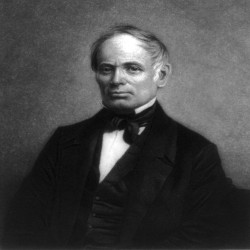
Adin Ballou
American Author
| Date of Birth | : | 23 Apr, 1803 |
| Date of Death | : | 05 Aug, 1890 |
| Place of Birth | : | Cumberland, Rhode Island, United States |
| Profession | : | Author, Prominent Clergyman |
| Nationality | : | American |
Adin Ballou the founder of the Hopedale utopian community, was a pioneering theorist of nonviolence, a socialist, and an abolitionist. The Hopedale Community (1841-1856) was based upon "Christian Non-Resistance," a form of nonviolence using non-injurious force, and "Practical Christian Socialism," a form of socialism that, unlike Marxism, included private property and the profit motive. Unlike many other abolitionist peace advocates of his time, Ballou did not abandon his nonviolent principles during the Civil War.
Life and Works
Ballou was born on a small farm in Cumberland, Rhode Island. Ballou's father was a farmer, and while Ballou craved a school and college education, his father didn't have the means to send him. At the time of the Christian 'reformation' sweeping through northern Rhode Island, his father became a deacon within the community. In early 1822 Adin Ballou married Abigail Sayles. Abigail Ballou died in early 1829, soon after the birth of a daughter, Abbie Ballou Heywood. Of Ballou’s four children only Abbie Ballou lived to adulthood. After his first wife Abigail had deceased, Ballou became very unwell. Lucy Hunter nursed him back to health, and after his sickness had passed, Lucy and Ballou married and remained married for the rest of his life.
Ballou was a prominent local historian for Milford and wrote one of the earliest complete histories of the town in 1882, "History of the town of Milford, Worcester county, Massachusetts, from its first settlement to 1881". Hopedale, Massachusetts remains true to what Ballou stood for, in keeping of the street names - “Peace,” “Hope,” “Freedom,” and “Union.” A statue of Ballou is located in Adin Ballou Park in Hopedale, Massachusetts.
Influence
Ballou's writings drew the admiration of Leo Tolstoy, who frequently cited Ballou as a major influence on his theological and political ideology in his nonfiction texts like The Kingdom of God is Within You, along with sponsoring Russian translations of some of Ballou's works.
Ballou's Christian anarchist and nonresistance ideals in texts like Practical Christianity were passed down from Tolstoy to Mahatma Gandhi, contributing not only to the nonviolent resistance movement in the Russian Revolution led by the Tolstoyans but also Gandhi's early thinkings on the nonviolent theory of praxis and the development of his first ashram, the Tolstoy Farm.
In a recent publication, the American philosopher and anarchist Crispin Sartwell wrote that the works by Ballou and his other Christian anarchist contemporaries like William Lloyd Garrison directly influenced Gandhi and Martin Luther King Jr.
Quotes
Total 2 Quotes
How many does it take to metamorphose wickedness into righteousness? One man must not kill. If he does, it is murder.... But a state or nation may kill as many as they please, and it is not murder. It is just, necessary, commendable, and right. Only get people enough to agree to it, and the butchery of myriads of human beings is perfectly innocent. But how many does it take?
But now, instead of discussion and argument, brute force rises up to the rescue of discomfited error, and crushes truth and right into the dust. 'Might makes right,' and hoary folly totters on in her mad career escorted by armies and navies.
